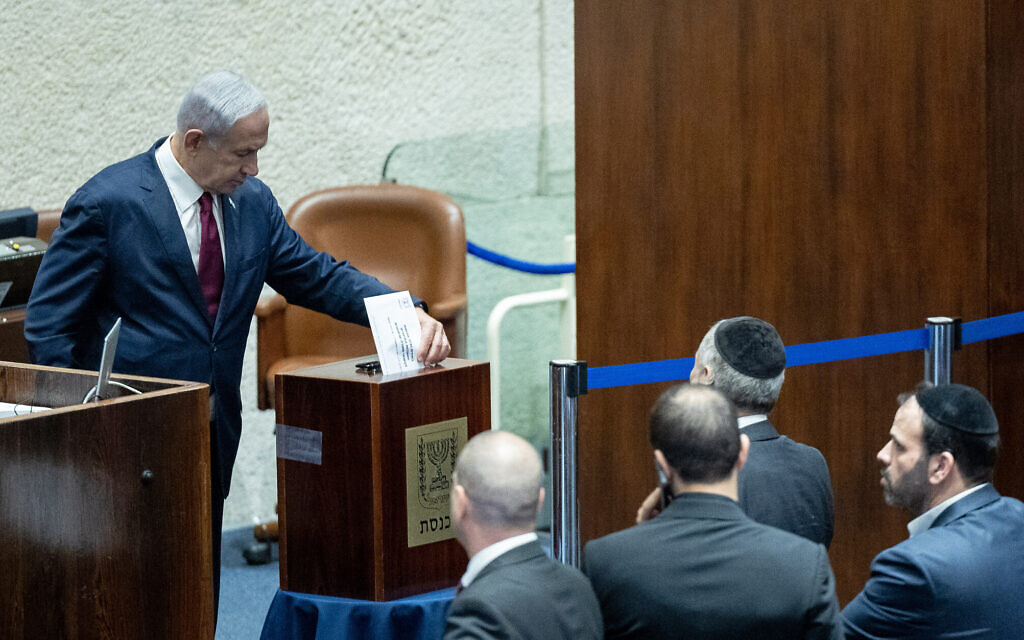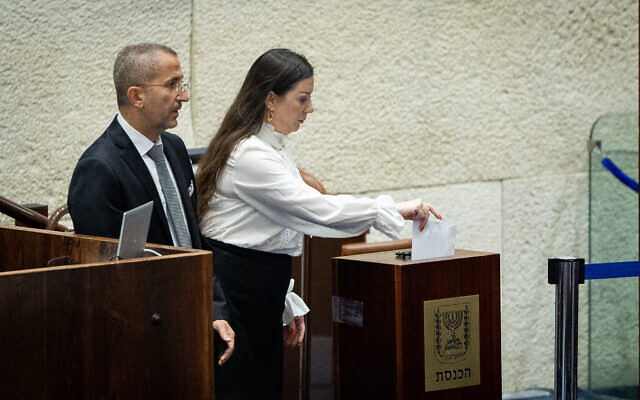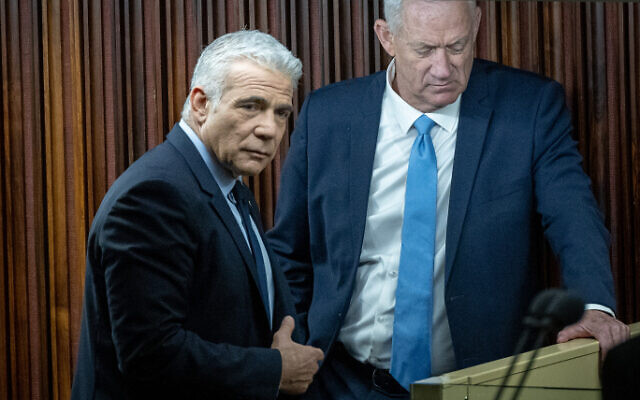For Netanyahu, yesterday’s embarrassment could become tomorrow’s win
Wednesday’s tumult in the Knesset has politicians accusing the PM of losing control, but it might have set the stage for him to solve his overhaul quandary

Wednesday’s Knesset vote to place lawmakers on the panel that selects Israel’s judges was one of the most charged and bizarre in the six months in which Prime Minister Benjamin Netanyahu’s coalition has been in power.
Pundits decried the event as a Netanyahu failure, after at least four coalition members defected to place opposition MK Karine Elharrar on the Judicial Selection Committee, defying Netanyahu’s order to torpedo both Elharrar and his own Likud party MK Tally Gotliv and enable a complete vote do-over within 30 days.
However, Wednesday’s secret ballot, in which Elharrar was selected and Gotliv was not, may have helped him out of a political vice, as he has struggled to balance pressures for and against his government’s plan to curtail judicial checks on political power.
The vote’s outcome, as well as the opposition’s reaction to it, may ultimately give the premier cover to advance enough changes to sell “reform” to the streets, but on subjects skirting the core of the concerns of the opposition and protest movement — and possibly the worst of their ire.
Although not a situation of his own making, Netanyahu took the cards that he was dealt and found a way to play them in his favor. Netanyahu was trying to push his coalition to tap Otzma Yehudit MK Yitzhak Kroizer alongside Elharrar, but it became clear shortly before voting that Gotliv refused to drop her name from the ballot, and thus threatened his plan.
Enough coalition lawmakers wanted to snatch both of the Judicial Selection Committee’s lawmaker seats that Gotliv’s election was possible if she stayed on the ballot alongside Kroizer. But opposition parties had made it clear that they would bolt negotiations on a compromise judicial reform if they did not get a representative, as has been customary.
Likud had promised Otzma Yehudit a panel seat as part of bringing the far-right party into the hardline coalition, and thus its leader found himself in a bind, unable to ensure the results of a closed-door vote.

In the end, Kroizer was persuaded to rescind his nomination and Netanyahu instructed the coalition to tank the vote and reject both candidates in order to trigger a 30-day delay. Except, not everyone listened. And then opposition leaders gave him the exact political cover he needed.
Yesh Atid’s Yair Lapid and National Unity’s Benny Gantz issued a joint statement shortly after Elharrar’s election, saying they were stopping talks because Netanyahu’s efforts to delay the vote had broken a promise to them and showed him to be dishonest, and as his actions had made convening the panel and renewing its work impossible for the time being. (Opposition lawmakers took to the airwaves on Thursday to clarify that the move is only a “pause” until the Judicial Selection Committee convenes.)
Justice Minister Yariv Levin is said to have threatened to not convene the panel at all in its current form, as he first demands passage of the highly controversial legislation to remake the committee in a manner that gives the coalition full control over judge selection.

Lapid and Gantz have been under considerable pressure from fellow opposition parties and the 23-week strong anti-judicial overhaul protest movement, who say that negotiations have been a fig leaf for the coalition’s intention to eventually steamroll unilateral changes.
With the opposition halting the talks, Netanyahu seized the opportunity with both hands, accusing it of thwarting the negotiations.
“Today it finally became clear that Gantz and Lapid were looking for any way to blow up the talks,” Netanyahu said in a Wednesday evening video statement, his first public remarks following the vote.
Netanyahu claimed opposition representatives “rejected every proposal — even the most limited” that the coalition had put forward. “Gantz and Lapid don’t want real negotiations,” he charged. “I promise you that unlike them, we’ll act responsibly for our country.”
There may have been more meaning to that sentence than mere political blame trading.
Netanyahu’s balancing act
Anger within the coalition over the results of the vote, and the opposition’s reaction, culminated in several calls for Netanyahu to release the overhaul package from its current freeze.
Far-right National Security Minister Itamar Ben Gvir urged Netanyahu and Levin to “bring the bill to change the Judicial Selection Committee for a vote on its second and thing readings. Reform now.”

Ultra-nationalist Finance Minister Bezalel Smotrich, whose Religious Zionism party had an active hand in shepherding the overhaul bills, reaffirmed that the coalition was prepared to push through unilateral measures.
“We very much want to legislate by consensus, but if the opposition blows up the talks at the President’s Residence, we will legislate independently, in accordance with the unequivocal mandate we received from a large majority of the Israeli public in the last elections,” Smotrich said.
“The opposition’s threats to unilaterally blow up the talks at the President’s house reveal their true face,” he added. “We will not agree under any circumstances to freeze the core of the reform.”
Similar voices were heard within Likud, including from Culture and Sports Minister Miki Zohar, a Netanyahu loyalist who said that if the talks were on ice, the coalition was now required to push through the overhaul.

“The opposition did not come in good faith to negotiations at the President’s Residence from the first moment, and today we received evidence of this,” he said.
On the other side of the equation, Netanyahu has contended with a fiery, six-month mass protest movement, a shaky shekel reacting strongly to the possibility of further instability, and at least four of his own lawmakers who broke ranks to vote for Elharrar.
The latter factor, analysts have suggested, raises doubts that the coalition even has the votes required to pass the more extreme ends of the reform.
A potential path forward
Over the past month, leaks out of the President’s Residence have written a playbook for how Netanyahu might proceed: by passing more limited, less divisive aspects of the overhaul plan. Specifically, laws to limit judicial review of government decisions for their “reasonableness,” and to let the government choose its own legal representatives rather than having to rely upon the Attorney General’s Office to advocate on its behalf.
Both ideas have been floated and have only received moderate public pushback, certainly when compared to the outcry and resistance sparked by Levin’s central declared goal of giving structural advantage to the government on the judge-picking panel, as well as affording the Knesset power to bypass any court decision to strike down bills.
Furthermore, coalition negotiators have claimed that behind closed doors the opposition has agreed to these relatively less drastic points in principle — although Yesh Atid and National Unity vehemently deny that they have done so. The opposition has insisted it will only agree to a full reform package deal that puts a rest to all issues and demands — or there will be no deal at all.

In fact, Netanyahu has been said to be mulling breaking off the two seemingly simpler issues and pushing ahead with them, with the hope that the opposition would not fight him as strongly on points upon which it is prepared to eventually concede.
Such a path could let Netanyahu present a minor win to his overhaul-demanding base, at a lower cost with the greater public. He could presumably now do so under his narrative that it was the opposition that pulled out of the president’s talks — even if they did so based on a justifiable fear that Elharrar’s election would be a pyrrhic victory on a non-functioning committee.
Protesters are still likely to pour into the streets, accusing Netanyahu of only slicing the first cut of a planned “salami” style, incremental legislative strategy. But it remains to be seen whether organizers could drum up the type of support they received at the height of the demonstrations in reaction to smaller-scale moves.
And for a prime minister contending with skittish global investors, spooked ratings agencies and diplomatic censure, passing only these secondary issues would offer Netanyahu the chance to turn to the world and say “I told you so” — that the actual legislative changes he was pushing through did not constitute the feared, bitterly criticized drastic erosion of the rule of law and assault on democracy.
There's no paywall on The Times of Israel, but the journalism we do is costly. As an independent news organization, we are in no way influenced by political or business interests. We rely on readers like you to support our fact-based coverage of Israel and the Jewish world. If you appreciate the integrity of this type of journalism, please join the ToI Community.

We’re really pleased that you’ve read X Times of Israel articles in the past month.
That’s why we started the Times of Israel eleven years ago - to provide discerning readers like you with must-read coverage of Israel and the Jewish world.
So now we have a request. Unlike other news outlets, we haven’t put up a paywall. But as the journalism we do is costly, we invite readers for whom The Times of Israel has become important to help support our work by joining The Times of Israel Community.
For as little as $6 a month you can help support our quality journalism while enjoying The Times of Israel AD-FREE, as well as accessing exclusive content available only to Times of Israel Community members.
Thank you,
David Horovitz, Founding Editor of The Times of Israel









